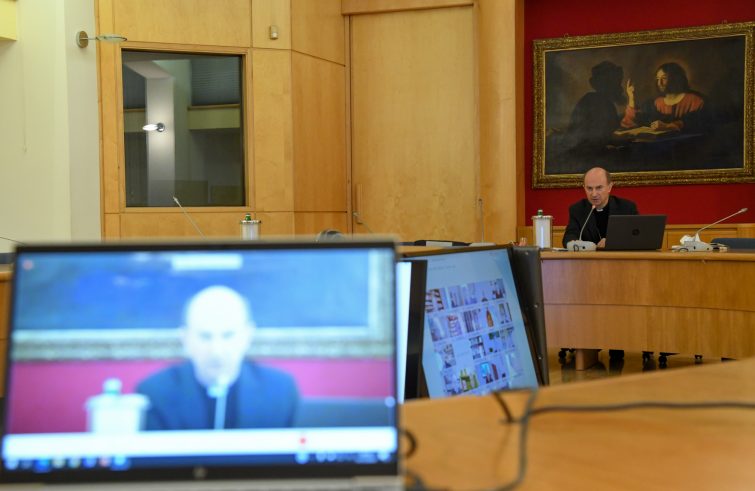
Christmas eve Mass requires “planning the beginning and length of the service at a time consistent with the so-called curfew”, reads the final declaration of Extraordinary Permanent Council of the Italian Bishops’ Conference (CEI), held online on December 1 to discuss the upcoming Christmas celebrations, notably the timing of Christmas Eve Mass. The bishops recalled the recent Message to the Christian communities in time of pandemic: “Liturgies and community meetings are subject to special care and caution. However, this should not discourage us: over the past few months we have seen that communal liturgies can be celebrated in full safety, in compliance with the established rules.” Hence “we are confident that this will also be the case for Christmas celebrations, as it has been so far.” “Given the different situations”, they remarked, “it will be the responsibility of the bishops to recommend that parish priests ensure appropriate distancing of the faithful, highlighting the richness of Christmas liturgy, which offers various opportunities: Christmas Eve Mass, at night, dawn and daytime.” “Thank you for your prayers,” said Cardinal Gualtiero Bassetti, CEI President, logged in from the Gemelli University Hospital, now convalescent after recovering from Covid-19.
“Hope, gratuitousness and attentiveness”:
Based on these three words, the bishops analyzed the situation in the country, tried by the health emergency and the resulting social and economic crisis. “In these sorrowful and difficult times, fear accompanied the discouragement of many. While we have seen a renewed return to faith and prayer, at the same time, confronted with unjust sorrow, there is a risk of succumbing to the fear of praying in vain”, remarked the bishops, for whom, “the Church must stand as a model of unity, steadfastness and stability to counter feelings of resignation, disaffection and despair.”
“We must all emerge from the health emergency with a heart that is more open to God and to others – declared the Italian bishops – with stronger faith and hope, with greater solidarity and charitable works”, with a Church “at the service of a fraternal economy and solidarity-based policies.” In fact, “the new beginning we all hope for, and which requires the contribution of all – clergy, political institutions, economists, lay groups – must not involve only the economic and social realms but the spiritual and ethical ones above all.”
Referring to the severe storms that hit the south of Italy, the bishops conveyed their “solidarity and closeness to all those affected by heavy rains that battered Sardinia, Sicily and Calabria, especially to those who lost their dear ones and whose homes and workplaces were damaged.” Proposals for this time of pandemic include “activating counselling centres to provide psychological and spiritual support to the many people who have been severely affected.” The Italian Bishops’ Conference also asked “to activate a bottom-up welfare system, with actions and initiatives aimed at alleviating the suffering of the last, the loneliness of the elderly, families’ preoccupations, and workers’ hardships.”
“To promote the Holy Rosary prayer on the Solemnity of the Immaculate Conception, broadcast live at 9 p.m. by Tv2000 and InBlu Radio, from a church in Rome”,
is the CEI proposal for December 8th. “As was done during the lockdown – reads the statement – it will be a moment of community prayer, to be lived together in preparation for Christmas.” “At a time dramatically marked by the pandemic – the bishops said – the Italian faith community will ask for the intercession of the Blessed Virgin Mary, She who cherished all things in her heart and confidently surrendered herself to the Father’s embrace. To Her – who, as Pope Francis reminded us, ‘is full of grace’, and ‘can reflect into the darkest gloom a ray of the Risen Christ’s light’ – . will be entrusted, in particular, women and mothers, the pillars of families and womb of the future”.
“Although the new editions of the liturgical books are not yet completed or those recently published have not yet been revised, meeting the need of vital full communion and homogeneity in the Lord’s Prayer”, the bishops said they hope that “as we begin to use the Missal, the new version will immediately be used in all other sacramental and non-sacramental liturgical celebrations (e.g., the Liturgy of the Hours) as well as in the practices of popular piety (such as the Holy Rosary).”
“In many Italian regions the third Italian edition of the Roman Missal has been adopted with the new liturgical year, from the first Sunday of Advent”, the bishops pointed out: “Novelties include the formulation of the Lord’s Prayer, a prayer that regulates and shapes the prayerful breath of the entire people of God, so dear and familiar in the faith experience of all believers, of all ages, regions and ecclesial communities.”










